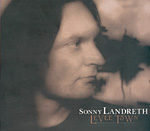Victoria Williams/"Water to Drink"
 Victoria
Williams has long been something of a cult item, perhaps esteemed by other artists
more than the general public — to wit the compilation "Sweet Relief,"
which featured her songs performed by an all-star roster of talent, including
Pearl Jam and Lou Reed, and handily outsold her own records. On her own, however,
the Louisiana-born singer/songwriter's loopy affect has sometimes been a distraction
from her considerable talent. So it's everyone's gain that on her latest effort,
Williams has settled into a groove that allows her to indulge her mannerisms
without losing the thread of the songs, or our attention.
Victoria
Williams has long been something of a cult item, perhaps esteemed by other artists
more than the general public — to wit the compilation "Sweet Relief,"
which featured her songs performed by an all-star roster of talent, including
Pearl Jam and Lou Reed, and handily outsold her own records. On her own, however,
the Louisiana-born singer/songwriter's loopy affect has sometimes been a distraction
from her considerable talent. So it's everyone's gain that on her latest effort,
Williams has settled into a groove that allows her to indulge her mannerisms
without losing the thread of the songs, or our attention.
Flavored with organ and pedal steel guitar, the performances explore a range of sultry rhythms with an assured, relaxed warmth perfectly suited to Williams' stylized, empathic singing. Indeed, it's hard to come away from this record without feeling that one has been in the presence of an exceptionally compassionate, tactile individual. The songs speak of serendipity, optimism and love, and many of them have people's names in the title; for Williams, making connections and spreading good karma is clearly as primal an urge as making music, and is actually undistinguishable therefrom. One of the album's major achievements is that it's able to dispense unrelenting good vibes ("hopeful joy is joy for all," she sings at one point) without becoming unbearably cloying, and Williams' well-publicized struggle with multiple sclerosis makes this generosity of spirit all the more admirable.
Her selection of "Young at Heart," one of several standards she successfully takes on, is particularly apropos — Williams is not merely young at heart but borderline infantile, and while her baby-talk affectations can verge on the precious, she's a savvy enough singer to pull it off. In the best songs, such as "Gladys and Lucy" and "Junk," the effect is as satisfying and sensual as the scent of lilac on a porch in the summer.
Sonny Landreth/"Levee Town"
 Musicians
whose primary asset is their instrumental prowess — OK, guitarists — tend to fall victim to one or both of two mistakes when recording solo albums.
The first is to assume that interesting guitar playing can somehow exist independently
from interesting music; the second is to overcompensate for the previous assumption
by focusing on the songs to the detriment of the hot licks that attracted people
in the first place.
Musicians
whose primary asset is their instrumental prowess — OK, guitarists — tend to fall victim to one or both of two mistakes when recording solo albums.
The first is to assume that interesting guitar playing can somehow exist independently
from interesting music; the second is to overcompensate for the previous assumption
by focusing on the songs to the detriment of the hot licks that attracted people
in the first place.
Sonny Landreth, who made his name as the guitarist for John Hiatt on the "Slow Turning" album about 10 years ago, manages to dodge both of these bullets on his second solo outing, "Levee Town," turning out a sturdy batch of bluesy "swamp pop" that's fairly dripping with riffsome virtuosity. Landreth's bailiwick is electric slide guitar, to which he brings a a killer sound and a revved-up attitude that takes the legacy of Ry Cooder and Lowell George and gooses it up to 78 rpm.
The title track, which kicks off the album, sounds like greased lightning with legs; imagine a guitar equivalent of Blues Traveler harpist John Popper, and you're halfway there. But it's not mere flash; the songs hold up on their own even as they provide showcases for the guitarist's highly evolved style. The lyrics reveal Landreth's deep preoccupation with his Louisiana heritage, and most of the songs revolve around a kind of Cajun mythology, with an occasionally felicitous turn of phrase like "The U.S.S. Zydecoldsmobile"; musically, Landreth filters the zydeco and Crescent City traditions through a more modern roots-rock lens. But the blues is never too far away, notably on "Broken Hearted Road," and if the neo-Southern Gothic lyric stylings sometimes overreach, they rarely drop the ball altogether, and all it takes is a quick blast like the sizzling instrumental "Spider-Gris" to get the pirogue floating down the bayou again.
